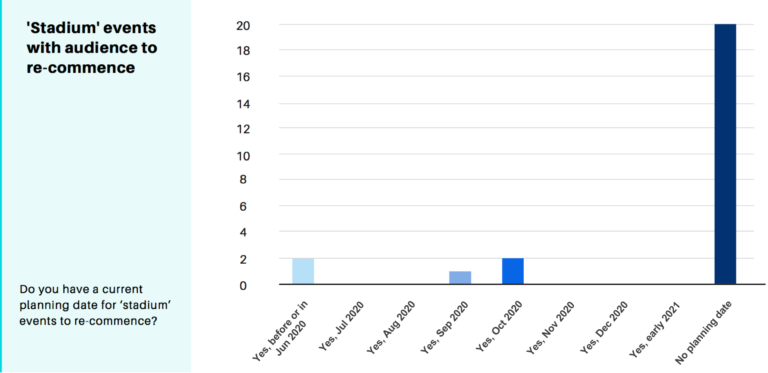As sponsorship professionals, we put relationships, be they brand-to-brand or with our audiences, at the heart of everything we do. Central to these relationships is humanity: knowing what people need, why they need it and how to fulfil that need in a genuine way.
With mass sport and entertainment event cancellations and businesses across Europe moving to work from home, now more than ever, we need to find ways to stay connected and do what human beings do best: adapt.
Over the last week, we’ve seen wholesale changes from automotive manufacturers working with the government to repurpose factories and tool up to produce ventilators to LVMH’s perfume arm using their skills to make hand sanitisers.
We’ve seen sports brands changing to fit the new needs of their customers, as Peloton and the Nike Training Club extend free trials and add at-home workouts to their apps or Borussia Dortmund livestreamed ‘digital fan viewing party’ allowing them and their partners to keep in touch with fans.
We’ve also seen media tastemakers like The Drum, shifting with impressive agility, as their usual SXSW commentary from the Soho-based Drum Arms shifted to a web-based festival on the apposite topic of digital transformation. In true Drum style, they also managed to recreate their intimate, almost conspiratorial, heard-it-here-first vibe, despite only being connected to their audience through a screen: https://www.thedrum.com/digital-transformation-festival
In times like these, in work as in life, relationships come first, so influencers not brands are the likely first port of call for consumers (also known as people, including me) to seek advice, find solace and relatability, so to survive we, as organisations, more than ever need to humanise the way we communicate.
My particular interest this week has been how small, medium and even large multinational organisations are changing the way they communicate with one another, starting with LinkedIn. There’s a big shift from me to we, which, to my mind, is good news exactly when we need it!
My bet is that those who cooperate with, support and talk to one another will thrive. Now is a time for community building and collaboration, not putting your arm round your homework or selling on toilet rolls to the elderly at a mind-blowing mark up (shame on you!)
Below are some examples I enjoyed over the course of last week.
1. Make confident moves, your way. Independent Record label Defected Records, known for bringing people together through music in their own unique way, stayed true to form and didn’t wait for government mandates. They regrouped, worked out what was best for their long-term business, culture and staff and took positive action postponing all events and sending their team to work from home. Not only did they take this bold move, they proudly announced their decision and reasons to shut up shop in a public statement: https://www.linkedin.com/posts/jameskirkham_defected-have-called-it-early-were-taking-activity-6644201765761888256-pM4x
They even showed their team set up and ready for business as usual in their new settings (https://www.linkedin.com/posts/jameskirkham_the-defected-records-insta-stories-right-activity-6644321106369097728-6yQe) before launching their Defected Virtual Festival: https://www.nme.com/news/music/defected-records-announces-virtual-music-festival-in-wake-of-coronavirus-outbreak-2627828
2. Support and inspire through new communities. Start-up skincare brand By Sarah whose purpose is “to empower conscious living” were straight out of the starting blocks sharing a link to a WhatsApp community that anyone could join that would provide constant company, tips for your new home-based lifestyle and stability at this time of change: https://www.linkedin.com/posts/lauren-murrell_covid19-community-helpeachother-activity-6645285039691182080-9UEY
3. Embrace the blank slate. With no live football taking place, League Two football club Leyton Orient FC seized the chance to be on a level playing field with the largest clubs in the land and kicked off a global call to join an inter-club, inter-league FIFA tournament: https://www.linkedin.com/posts/josh-stephens-b940855a_leyton-orient-on-twitter-activity-6645294744324845568-qHMm
With well over 100 teams signing up, 3.9k retweets and 17.7k likes on Twitter (when they regularly get only one or two) they even used the popularity to call for new partners on LinkedIn and in the last week have announced both a renewal and a new deal! Go the Os.
4. Put a human face on it. Energy giant BP isn’t known for being the most accessible organisation and takes its share of flak (not always fairly), but their new CEO (who is also active on Instagram @bernardlooney_bp) has put his head above the parapet and not only to highlight the good deeds BP is doing.
He’s been discussing the current situation in the first-person, showing his personal set up, casual work gear and even used an emoji! A shout-out to both the BP workers who can’t decamp home and the wider everyday heroes in society – doctors, nurses, police, teachers shows a human quality and awareness that we should all keep front of mind: https://www.linkedin.com/posts/bernardlooneybp_last-week-i-explained-that-everyone-at-bp-activity-6645634611365982209-KgQc
5. Help us understand. A personal favourite when it comes to comms thought leadership for their Trust Barometer, Earned Brands report and crystal ball amongst others, is always global PR leader Edelman. Finger on the pulse, they started releasing easily digestible blogs week ago to handle crisis comms, specifically relating to the COVID-19 situation.
However, they surpassed themselves in my eyes two days ago when they released their 10-country Trust Barometer Special Report, acknowledging that the annual thought leadership piece they release at the start of each calendar year and dine out on for the next twelve months may no longer be accurate in these unprecedented times, yet now more than ever we need to know how to build trust among uncertainty:
https://www.linkedin.com/posts/edelman_edelman-trust-barometer-special-report-on-activity-6646049798766108672-S04z
As the global situation continues to evolve, it’ll be interesting to see how they stay on top of the crisis, but I’ve no doubt that with their insight and experience they’ll help us all to make better informed choices as it unfolds.
Needless to say, WeAreFearless are doing everything we can to ensure business as (or better than) usual, as well as cultural and commercial continuity, all of which can be followed here: https://www.linkedin.com/company/wearefearless/. If you have other examples, share them in the comments section, or with katie@wearefearless.com
European Sponsorship Association is a Strategic Partner of Host City












